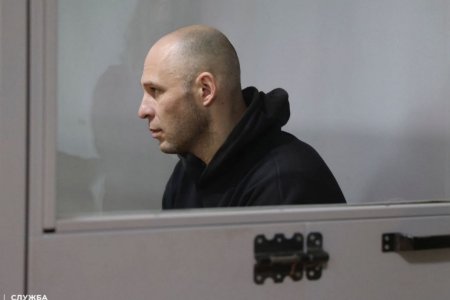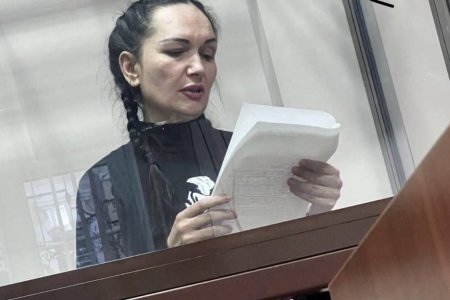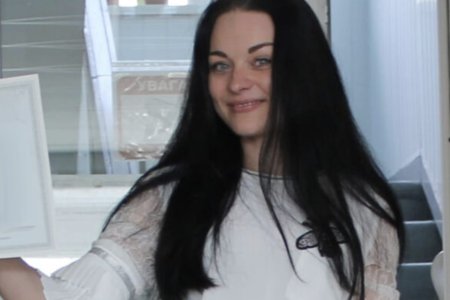
Ukrainian prisoners of war Viktor Didyk and his son, Roman Didyk, have been sentenced to eight years’ imprisonment in Russia on surreal charges linked solely with their service in defending Ukraine. Both Ukrainians have been recognized as political prisoners by the authoritative Memorial Support for Political Prisoners Project.
Both Viktor Didyk (b. 21.01.1966) and Roman Didyk (b. 26.10.1990) were mobilized into the Ukrainian Armed Forces on 4 March 2022, ten days after Russia’s full-scale invasion of Ukraine. They were presumably serving together when taken prisonerby the Russians on 8 April 2022 near Rubizhne in Luhansk oblast.
On 10 April, 2022, a video of Roman Didyk’s supposed ‘interrogation’ was posted on YouTube. Roman has been forced to sit without a shirt, with the camera focusing on the young man’s tattoos (the Ukrainian Trident, and others, less discernible). Roman was clearly very stressed and nervous, and there is every reason to assume that he was speaking under duress when he said that he had received an order “to kill the civilian population” and that he had been in shock over this. 0n 19 April, another supposed ‘interrogation’ was shown on the Russian FSB-controlled VKontakte social network, in which Roman answered that he had been on the Euromaidan protests, albeit for just two days, and that he had served in a volunteer battalion.
Since one of the charges pertained to this alleged membership of the Dnipro-1 Regiment in 2015, it is worth noting that the only evidence of this involvement mentioned in the report is from an ‘interrogation’ when Roman Didyk was totally under the control of his Russian captors. The same ‘confession’ may well be included in the interrogation protocols thrust in front of Viktor Didyk, however he explained in court that he had agreed to sign those documents on the promise that he and his son would be exchanged for Russian POWs and would be able to return to Ukraine. He was bitterly deceived. In its statement, Memorial points out that the purported ‘confessions’ cannot be taken into account given the considerable evidence that these are obtained through torture, ill-treatment, and in appalling conditions. This has been confirmed by the Independent International Commission of Inquiry on Ukraine, as well as by numerous other authoritative bodies. Virtually all prisoners of war or political prisoners who have finally been allowed access to independent lawyers, or been released, have confirmed that any ‘confessions’ were obtained through torture, or through threats that their torturers would subject their wives or other family members to the same treatment.
The charges themselves were astoundingly lawless, of which all involved would have been fully aware. Both father and son were accused, under Russian legislation, with ‘taking part in a terrorist society’ (Article 205.4 § 2 of Russia’s criminal code); and illegal possession, transport, etc. of arms and ammunition (Article 222 § 3a.
The first of these charges was over the claim that the two men had, in 2015, jointed the volunteer Dnipro-1 Regiment, while the ‘arms’ charge was because the two Ukrainian soldiers, defending their country as part of Ukraine’s National Guard, were armed.
In reporting the sentences on 14 December 2023, the Rostov regional prosecutor avoided any mention of the fact that both men are prisoners of war, and as such enjoy protected status under international law. The report, instead, asserted that sentences had been passed “against two Ukrainian nationals accused of terrorism’ It went on to claim that the court had established that father and son had joined Dnipro-1 in 2015, with this described as “a terrorist society”. The report then asserts that “the said formation took active part in military action aimed at forcing the residents of Donbas to reject the decision taken on self-determination”. With respect to the second charge, the prosecutor asserts that the defendants arrived “to carry out military action” in what is claimed to be Rubizhne in the Russian proxy Luhansk people’s republic, and that they had arms and ammunition on them.
Essentially every part of the above is false, from the claim that Dnipro-1 was a terrorist organization to the assertion that Rubizhne was part of the ‘Luhansk people’s republic’. In explaining their grounds for declaring the two men political prisoners, Memorial points out that the volunteer regiment Dnipro-1, which Russia is claiming was “a terrorist society”, was in fact a special purpose unit of Ukraine’s Interior Ministry and as such took part in the military conflict in Donbas Whereas Russia’s supreme court has been used to unwarrantedly declare the Azov Regiment ‘terrorist’, there has been no such ruling with respect to Dnipro-1. There were, therefore, no grounds for the ruling with respect to a regiment which was fully legal in Ukraine and was carrying out perfectly legal military tasks. Nor is there any justification for Russia’s rewriting of history and claim of legitimacy for illegal structures that even Russia, which had created and fully controlled them, did not recognize until the eve of the full-scale invasion.
With the second charge, that of possessing arms and ammunition, Russia is flagrantly violating the Fourth Geneva Convention relative to the Treatment of Prisoners of War. Obviously the two soldiers, who were forced to surrender near Rubizhne, were in possession of weapons. They had these, as members of the Ukrainian Armed Forces in response to Russia’s international crime of aggression against Ukraine.
Both charges were, thus, without any substance. This did not stop presiding ‘judge’ Kiril Nikolaevich Krivtsov and two colleagues from the notorious Southern District Military Court in Rostov-on Don from finding both men ‘guilty’ on 14 December 2023 and passing 8-year sentences to be served in a medium security prison colony.
Russia is using such ‘fabricated ‘trials’ and sentences for propaganda purposes, as part of its attempts to replace historical facts with its false narrative. These ‘convictions’ are particularly disturbing as Russia uses them to deny the men their rights as prisoners of war, and to prevent their release in prisoner exchanges.



